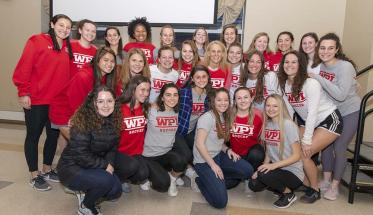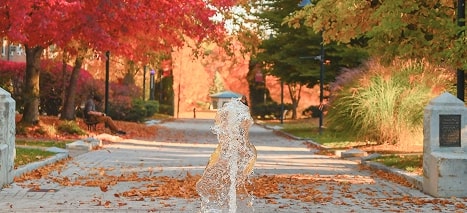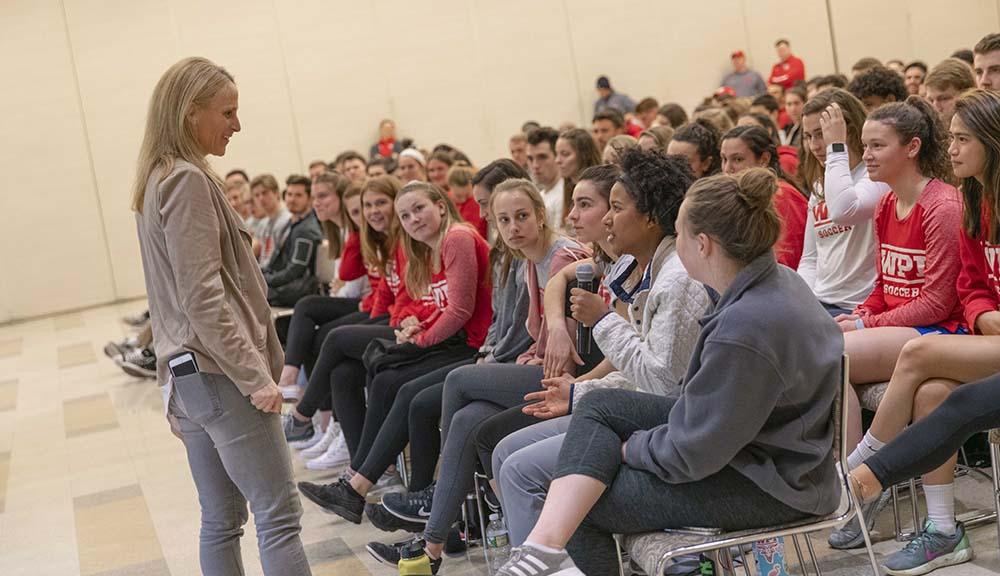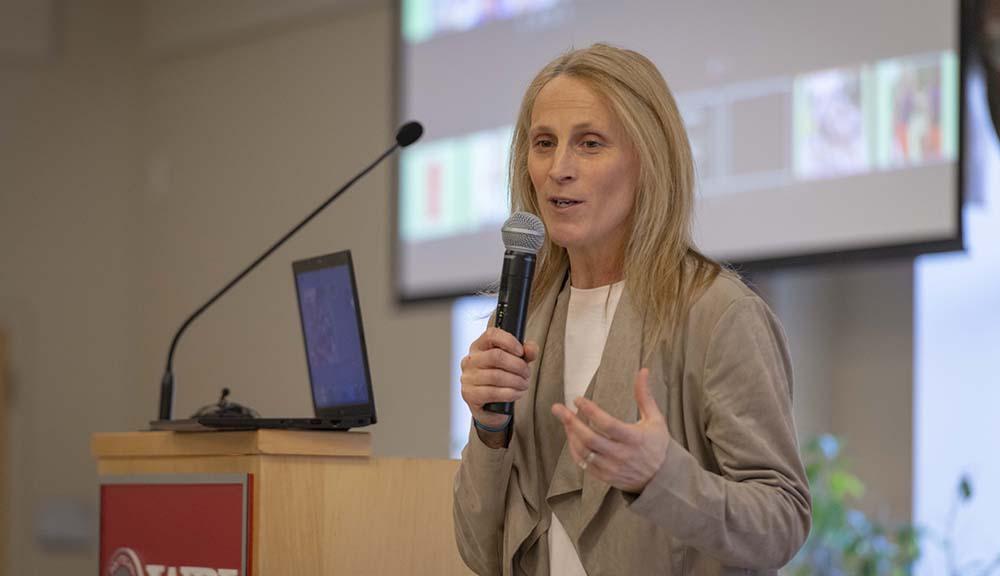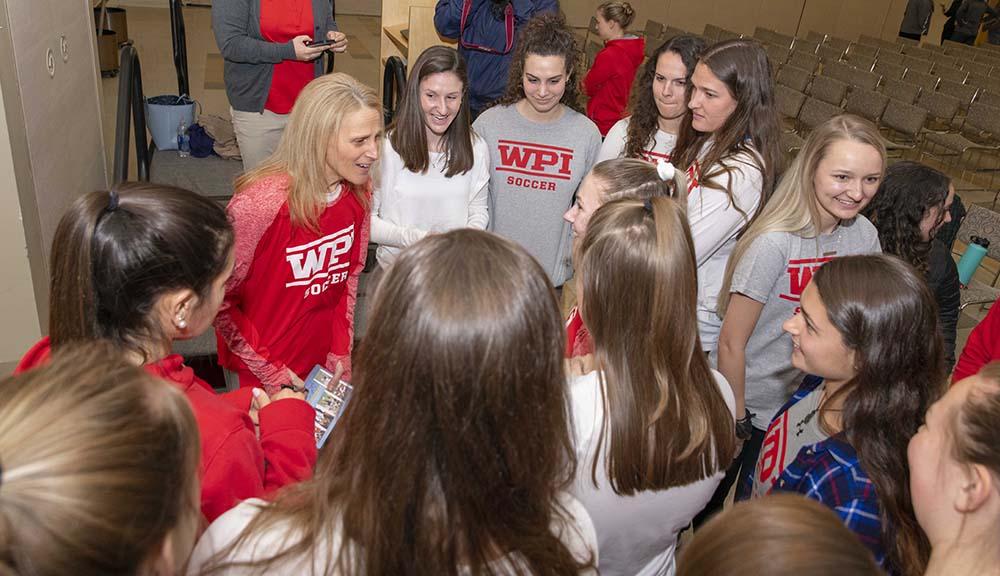Three-time Olympian and World Cup soccer champion Kristine Lilly related her experiences in fighting for gender equity and equal pay to a standing-room-only crowd in the Rubin Campus Center Odeum last week. She was joined via video chat by University of Massachusetts-Lowell Associate Professor of Political Science Jeff Gerson, author of the book, An Oral History of US Soccer Women’s Fight for Gender Equity, 1970 to Present. Their talk and presentation were delivered for the first time since the U.S. women’s soccer team filed a federal lawsuit earlier this month against the US Soccer Federation regarding pay equity and gender discrimination.
Lilly told of an incident that happened when she was nine and was the only girl on a team of boys playing in a tournament. The officials declared the team ineligible to compete if a girl were on the roster, and the team chose not to play in the tournament without her. That was her first experience of gender inequality, and also the first time she realized the strength of a team uniting behind a cause.
When she joined the U.S. Soccer team in 1991, there was no labor contract and no food stipend. Lilly and her teammates would each put five dollars into a pool to buy bagels each morning. Four years later, child care, food allowances, and better hotels were included in the contracts when the players used the only leverage they had—the threat of an Olympic boycott. This tactic was suggested to them by tennis great Billie Jean King, and the team leadership was responsible for keeping solidarity despite the fear of losing everything they had gained.
"I think it’s so important for women to see women doing things! We need to get more women elevated to doing what they want to do in life." --Kristine Lilly
Both speakers credited corporate sponsors for providing leverage in negotiations, as sponsors had previously done for women’s professional tennis in the 1970s. The “If You Let Me Play” television commercials Nike ran in the mid-1990s inspired girls, as the new Nike ad narrated by Colin Kaepernick, featuring athletes Shaquem Griffin and Serena Williams, aims to today, Lilly said.
The team was fortunate that on several occasions contract negotiations were scheduled to take place just before important matches. Each time, Lilly said, there was an intuition that the team was also negotiating on behalf of future women players, and that each victory would have a broader impact on women around the world. Gerson pointed out that in recent years, boycotts have occurred with women’s national soccer teams in Canada, England, Australia, Denmark, Norway, Ireland, and Scotland, with conflicts in Africa and Latin America looming. The speakers emphasized that the U.S. soccer team was a pioneer in equity in women’s sports.
Lilly pointed out that team successes on the field were pivotal to their successes off the field—without a winning record, contract negotiations would have been much more difficult, and the wins gave them the confidence to continue to fight for other rights.
Favorite Victories
A New England native, Lilly’s career with the U.S. Women’s soccer team spanned three decades, which included Olympic gold medals in 1996 and 2004, and a silver medal in 2000. She was a member of the championship World Cup teams in 1991 and 1999, and the teams that won bronze medals in 1995, 2003, and 2007. The iconic 1999 World Cup championship team brought national attention to women in the sport. She played for several professional soccer teams, including the Boston Breakers, before retiring in 2011 and her induction into the National Soccer Hall of Fame.
When asked about her favorite victory, Lilly mentioned the first World Cup victory in 1991 and her first Olympic Championship in 1996, but admitted that there was a special place in her heart for the 1999 World Cup championship. It was the most successful women’s sporting event in history, and was hosted by the United States. She feels that that final win in the Rose Bowl fit into a bigger picture because it changed society’s views on women athletes. It also showed that women could be “…strong, confident, smart, competitive, and want to be the best at something—but were also marketable.”
“I think it’s so important for women to see women doing things! We need to get more women elevated to doing what they want to do in life,” she added. Lilly started to play organized soccer when she was six, first played internationally when she was sixteen, and went on to receive one of only three college soccer scholarships offered for women at the University of North Carolina.
When asked if she would encourage her daughters to participate in sports, she answered enthusiastically, “I have two daughters—I’ve encouraged both of them to play sports. I love team sports. I love the camaraderie and support that they get from their teammates, and become friends, and just come together with a group of people to have a common goal, to be successful and win championships, or winning games ... it’s a very powerful thing!”
The program was organized by WPI Athletics, the Women’s Impact Network, and the Division of Talent & Inclusion.
-By Barry Hamlette
